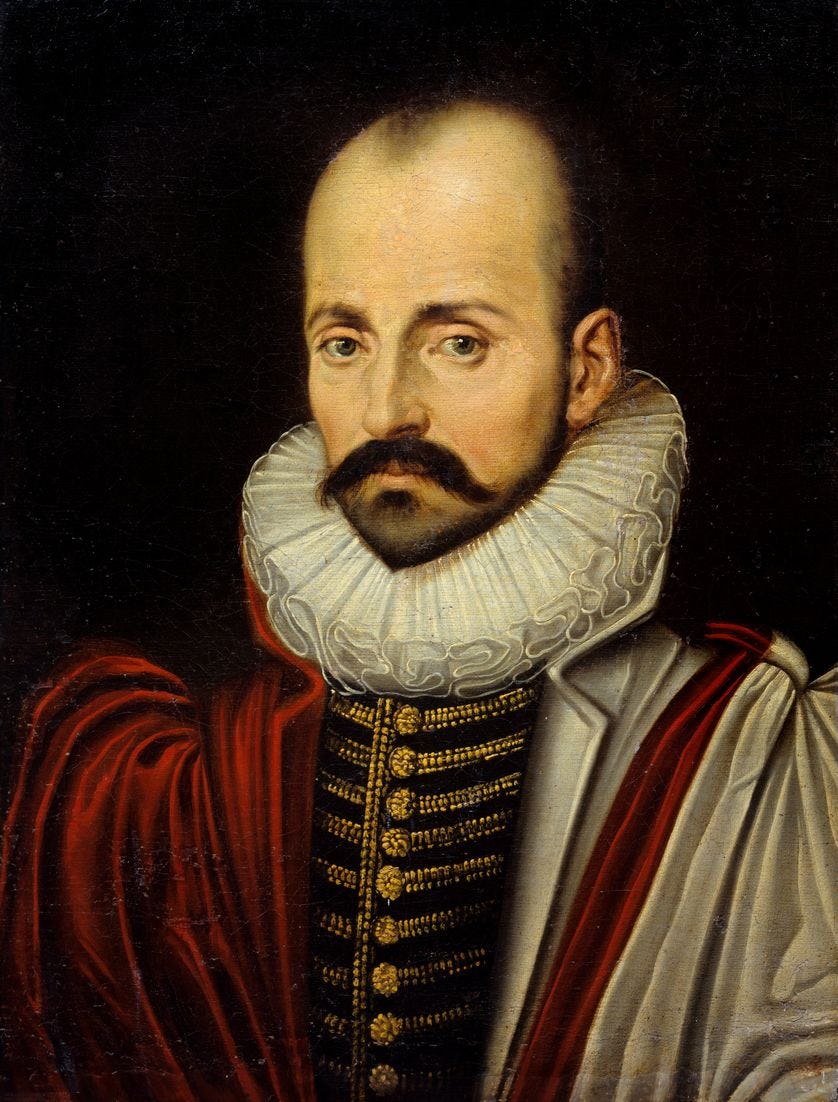Montaigne at Golgotha
In everything else there may be sham: the fine reasonings of philosophy may be a mere pose in us; or else our trials, by not testing us to the quick, give us a chance to keep our face always composed. But in the last scene, between death and ourselves, there is no more pretending; we must talk plain French, we must show what there is that is good and clean at the bottom of the pot...
— Michel de Montaigne, "That our happiness must not be judged until after our death"
Someone recently pointed out to me that the contemporary digital newsletter stands firmly in the tradition of the essay. This same person also pointed me in the direction of Michel de Montaigne's essays, which are in a way the fountainhead of the modern essay genre. I'd even argue they closely resemble blogs — many of the entries are just a few hundred words in length. The reflections are often intensely personal and introspective, and Montaigne himself even claims that he doesn't intend them for widespread reading. Well, whatever the sincerity of that sentiment, his hopes in that regard have clearly been subverted.
Montaigne's reflections include a range of subjects, but he often concerns himself with death (at least in my limited reading). The epigrammatic quote that opens this piece is characteristic of his essays. This is unsurprising. His Renaissance humanism compels him to engage with the classics, which notably often deal with how to die — specifically, how to die "well".
I think it's interesting that Montaigne engages with the "pagan" philosophers while also being ensconced in Christendom, because I truly think the Classical and Christian understandings of death are often difficult to square. I feel at first glance that these beliefs are so deeply at odds with each other, for the idea of a "good" death is undercut by the gospel, which treats death as a vanquished enemy. The classical view of a good death is one undertaken with dignity, poise, and composure. Yet in Christ's prayer in Gethsemane, he prays for the cup of suffering to be taken from him if possible, and he experiences such acute stress that his sweat is described as being tinged with blood. His cry of dereliction from the cross expresses profound anguish. There is little stoic serenity at play here. And the very manner of his death is anything but dignified — a criminal's death of torture and humiliation via slow asphyxiation. In Roman society, crucifixion was something that ought not be spoken of in polite company, for arguably good reasons.
But even in the midst of such horrors, goodness, in the sense of magnanimity, appears. He summons his beloved disciple to care or his mother. And he not only forgives his torturers, but sees their frailty and ignorance — "they know not what they do."
We call the Friday of his crucifixion "good", and so I wonder how Montaigne's conception of a good death squares with it. For Montaigne, death is something that is common to all people. It is the ultimate ground of solidarity. As such, it is also something that should catch none of us unaware. It even caught the Son of God, and he faced it willingly. If death is a place of solidarity between the human and the divine, then that only reinforces the commonality of it to all people. But Christ also suggests that the manner of death is not necessarily indicative of the quality of a person's life — speaking those crushed by a falling tower, he notes that they were no worse sinners than any other. Again, though, I think Montaigne resonates with this point, for he notes that death may strike any one of any age at any time.
Montaigne's admonitions to accept the reality of one's death, and to live well in light of its inevitability, are commendable, and I think we ought to heed them. But I also think that this again brings attention to the matter of discontinuity between the Christianity and the Classical world. Just as the lowly, the oppressed, and the weak are elevated over and against the haughty, the powerful, and the strong, so in death we see the foolishness of God outwitting the wisdom of the world. For in the place of death and dereliction, we see resurrection spring, a resurrection that is not wrought by human power or poise, but freely given by God himself.



